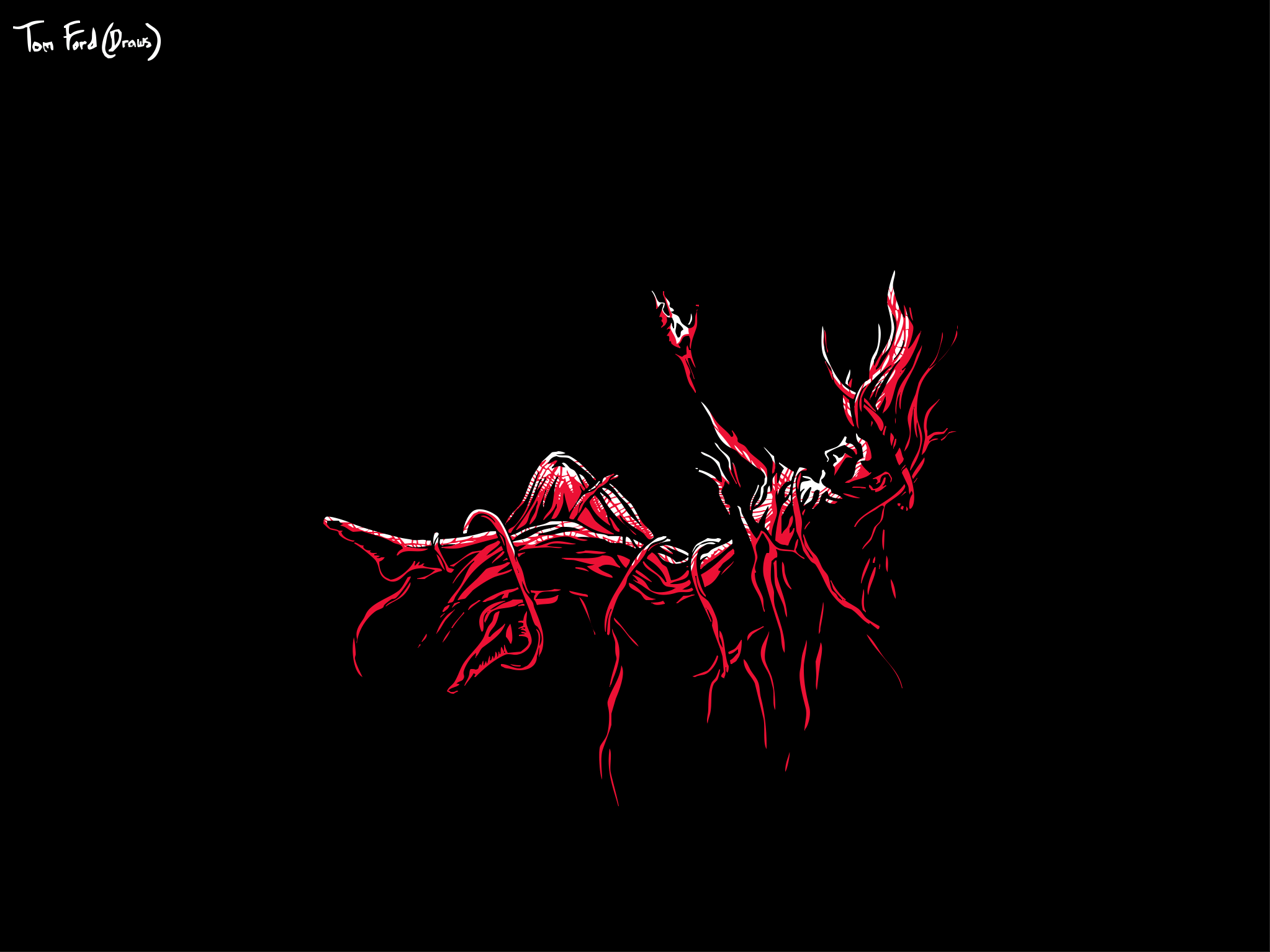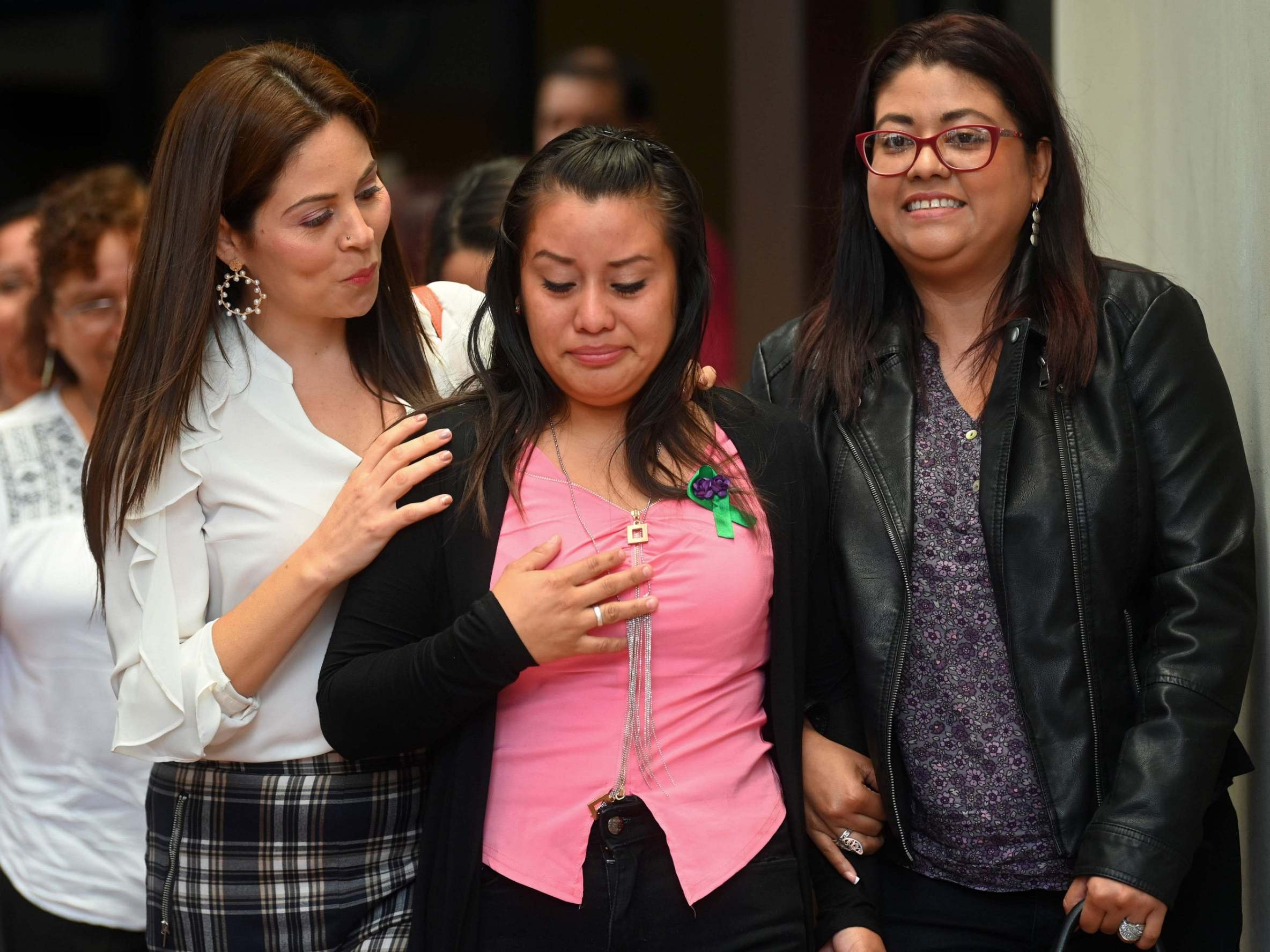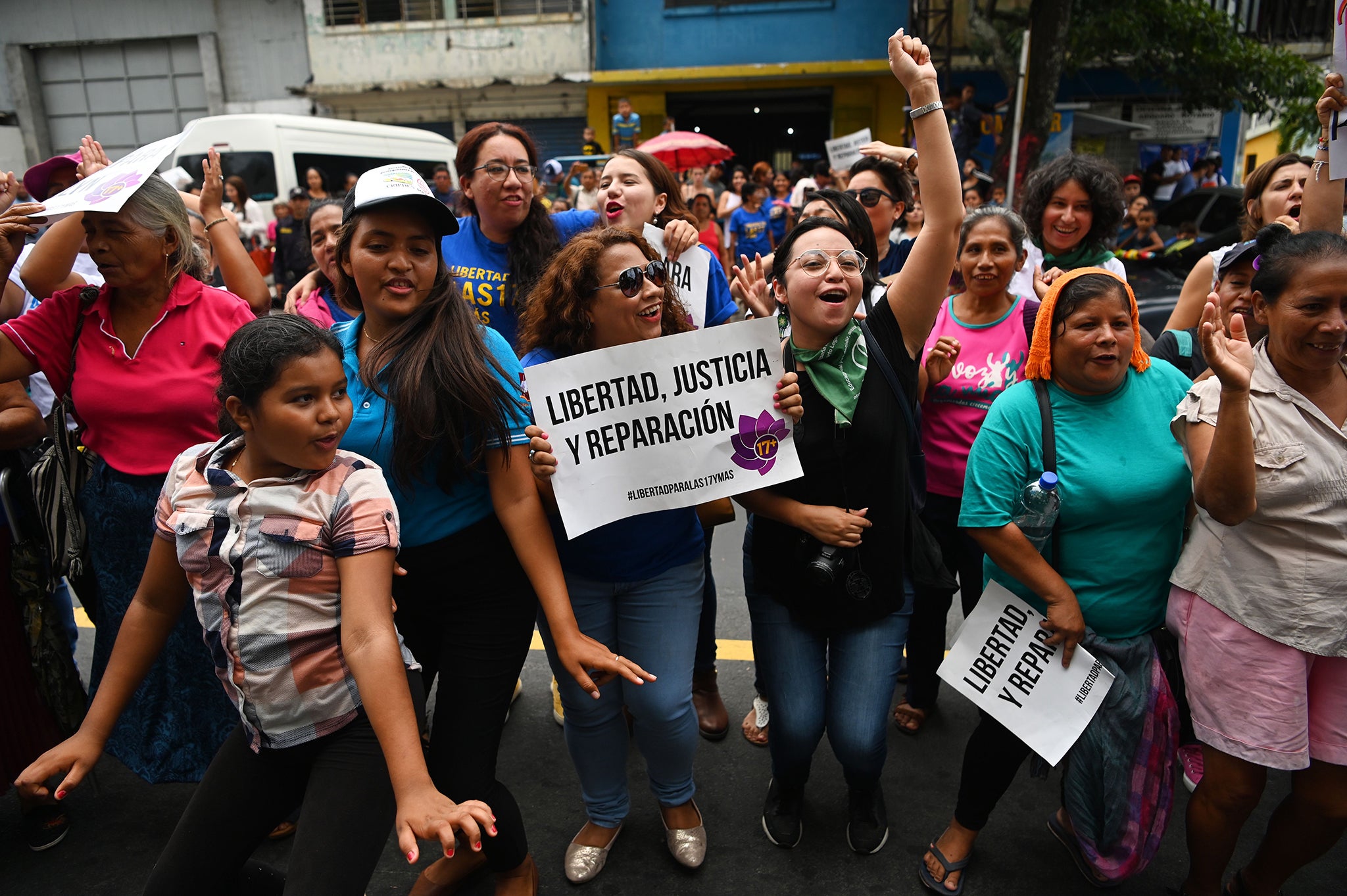Raped, miscarried, arrested: Inside El Salvador’s ‘outrageous’ state-sponsored persecution of vulnerable women
Dozens of women are serving decades-long sentences in the country for miscarriages and stillbirths, often as a result of rape, with some handcuffed to a bed while they are still haemorrhaging. Lucy Anna Gray speaks to the activists and lawyers fighting to free them and change the law once and for all


After 33-months in prison for having a stillbirth as a result of rape, Evelyn Hernandez was released. Less than two years later she was dragged back to trial with prosecutors demanding she be sentenced to 40 years for aggravated homicide. The now 21-year-old spent three years going through trials, jail and scrutiny, all while she was still recovering. In her first trial, Hernandez didn’t use the sexual assault as defence out of fear of violent repercussion. It wasn’t until she later received therapy that she would share this information.
Hernandez has since been acquitted and is now a free woman, with plans to go back to school. Her case is a win – albeit a long-awaited one – for El Salvador activists. She can now return to her old life.
But dozens of women are still serving decades-long sentences in El Salvador for miscarriages and stillbirths. Women continue to be handcuffed to hospital beds, still bleeding as they are arrested. There is a systemic fight targeting women in this Central American country – and local activists warn it is being perpetuated by the state.
Hernandez became pregnant after she was raped when she was 18 years old, and has always maintained that she was unaware she was pregnant. After fainting in an outhouse near her home in April 2016, her mother took her to the hospital, where doctors found she had given birth. The body of a baby was later found in a toilet septic tank and the teenager was arrested.
The case “legally doesn’t make any sense”, says Paula Avila Guillen, a human rights lawyer who has worked closely with Hernandez. “[The prosecutor] recognised that Hernandez didn’t do anything intentional and they just practically created a theory of a case of what it would be seen as negligence.” After arguing that Hernandez, a teenager with no medical training, was negligent for not knowing how to respond to an obstetric emergency, prosecutors wanted to convict her of aggravated homicide.
Guillen, who is also a director at the Women’s Equality Centre, says this case is even more “outrageous” than similar instances in El Salvador. “She was already sentenced one time then appealed, and then she was released … but still the prosecutors took her to retrial; that just shows a level of malice to really use all the weight of the state to charge these women.”
In cases such as Hernandez’s the state is the prosecutor, bringing women to trial for their supposed crimes. “It is the attorney general wanting to use all its weight and power to criminalise women,” Guillen says.
Human rights groups warn women are being sent to prison with little to no evidence of a crime. Maricela Albizuri, another woman charged with aggravated homicide, was almost immediately handcuffed to her bed after arriving at hospital following stillbirth in a bathroom. She was then given a gynaecological exam, for which police were present.

Four days later she was taken to prison and detained for six months. It had a serious effect on her mental health.
“The immediate detention and interrogation of a woman seeking urgent medical care in the wake of a traumatic incident, including the presence of police investigators during private examinations, implicates the basic rights to health and dignity,” a report by the American Bar Association states.
David Pressman, executive director of the Clooney Foundation for Justice, said: “When charges are brought without evidence, it raises concerns about a state’s compliance with international standards … and, in some cases, it can suggest an ulterior motive for the charging decision.”
In the majority of cases the state investigates, the women go straight from the hospital to the jailhouse, even if they are haemorrhaging. With the fear of punishment hanging ahead of them, many women and girls are avoiding medical help, which can lead to long-term health problems. And it isn’t just mothers that face prison. In El Salvador, the person assisting or facilitating birth or obstetric emergencies can also be prosecuted. “Hospitals are becoming crime scenes. And women cannot access abortion even to save their own lives”, Guillen says.
There was little evidence differentiating Albizuri’s stillbirth from any other, but prosecutors went ahead with charges, leaving her in prison for months before trial. “In the cases of Ms Hernandez and Ms Albizuri, based on our monitors’ reports there was a significant lack of evidence brought forward during the judicial proceedings themselves. We were also deeply concerned by a number of aspects of the pre-trial investigation, which are likewise within the state’s control,” Pressman says.
Both women are now free due to the tireless work of activists, legal teams and global attention on their cases, but many aren’t so fortunate. “It is impossible for things to get worse in El Salvador. There are still 50 women in prison serving sentences up to 30 years for miscarriages and stillbirths. That is the reality,” Guillen says.
Long before these cases reach a judge, the state works to put women with at-risk pregnancies behind bars. Alberto Romero, founding partner of the Citizen Group for the Decriminalisation of Abortion in El Salvador, says the situation is “active persecution of women”. After the total criminalisation of abortion in 1998, the attorney general’s office said all hospitals must report any suspicion of abortion. “If they did not, they would be accused of covering up or collaborating,” Romero says.

These policies have a disproportionate impact on the least-privileged women. Roughly two-thirds of the women prosecuted are 25 or younger and in 72 per cent of cases the father is no longer present. “In other words, this penalising legislation only applies to young women of low educational level, with very low or no economic income and who live in situations of marginalisation and poverty and also face this situation alone without a partner,” Romero says.
Despite such difficult circumstances, women’s movements are growing to battle the harsh, restrictive laws, as seen in the eventual acquittal of Hernandez and Albizuri. “There have been certain signs of change; a female MP in El Salvador has insisted on a change in the legislation. Women’s movements have made progress in terms of organising themselves and reporting on women who have been incarcerated for abortions and miscarriages,” Ada Zambrano, deputy regional director of Care International, says.

Women wrongly imprisoned for obstetric emergencies have been sharing their stories with the UN, drawing the world’s attention to the human rights abuses they face. “There is nothing more powerful than to hear it in their own voices, from someone who spent 10 years in prison and to come out and share their own story,” Guillen says. “That has really clicked with El Salvador and with society, to hear the stories of these women, and women who were separated from their child.”
Now a free woman, Hernandez “has many goals for the future”, according to her lawyer Elizabeth Deras. She plans to finish high school and study for a degree in computer science or English. Deras adds: “She’s also told us that she wants to get a job to help her family and especially her mother.”
This case could be the much-needed springboard for those still languishing behind bars, and potentially even change how women are prosecuted in the future. “There’s no doubt this case set a precedent, it has also provided us with jurisprudence for future cases to be known and to strengthen the defence arguments against judgments of women already convicted,” Deras says.
Join our commenting forum
Join thought-provoking conversations, follow other Independent readers and see their replies
Comments
Bookmark popover
Removed from bookmarks